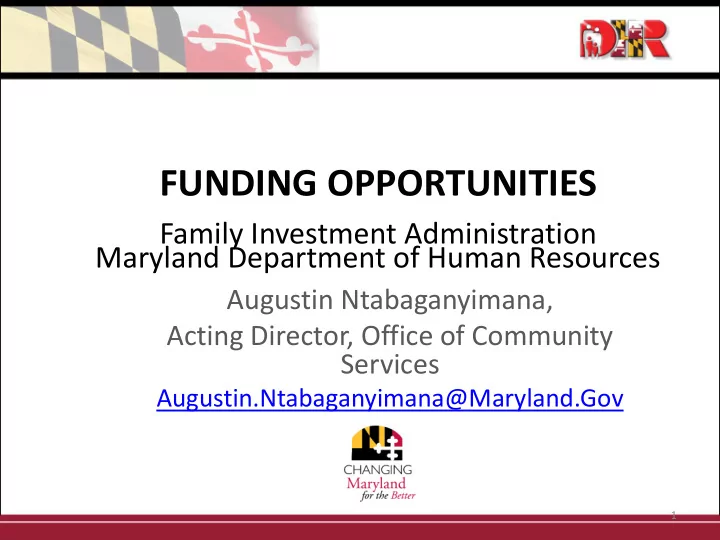

FUNDING OPPORTUNITIES Family Investment Administration Maryland Department of Human Resources Augustin Ntabaganyimana, Acting Director, Office of Community Services Augustin.Ntabaganyimana@Maryland.Gov 1
PRESENTATION OUTLINE • Food Supplement Employment and Training • Maryland Emergency Food Program • Statewide Nutrition Assistance Equipment Program • Federal Refugee Assistance Programs 2
FOOD SUPPLEMENT EMPLOYMENT AND TRAINING What is FSET? Examples of services FSET Partners Provide FSET is a new program that connects people who receive • Hard skills training in an in-demand industry monthly food supplement • Soft skills training in communication, benefits (SNAP, or known as customer service, and more Food Stamps) to job-driven • Industry-recognized certifications and credentials training programs. • Referrals to other community services to address employment barriers FSET programs are free of • Resolution of employment barriers, such as criminal record, legal services, or driver’s cost to participants, and run licenses for 12 to 16 weeks on • Support from a personal career navigator average and success coach • Job placement assistance 3
HOW TO BECOME AN FSET PARTNER? • An FSET partner may be an non-profit organization, local government entity, or an educational institution that provides employment services and/or related supportive services • A partner must be able to raise funding “match” required by USDA • Interested in receiving more information about FSET Partnership? Please email sean.washington@maryland.gov. Sean may also be reached by phone at 410-767-8822 4
MARYLAND EMERGENCY FOOD PROGRAM (MEFP) Program Characteristics What is MEFP? Through MEFP, we provide grants to • Total funding available is non-profit and local government $1,000,000 organizations that provide groceries or meals, at no cost, to households • MEFP is available in every and individuals who are in need. Such county in Maryland organizations include: soup kitchens, • food pantries, shelters, food banks, Unemployment rate and residential treatment programs, and poverty level are two factors after-school programs. used to determine jurisdictional allocations Funded partners are required to • Grant awards range between distribute information regarding Earned Income Tax Credit (EITC). $2,000 and $25,000 5
HOW TO BECOME A MEFP PARTNER? • MEFP Application and instructions are generally released in March. These documents are posted on the DHR website and emailed to the MEFP listserv • Applicants have 6 weeks, from the release date, to prepare and submit applications. FY 2018 application deadline was April 21, 2017. • Please email Annette.Jones-Wilson@maryland.gov if you are interested in being on the MEFP listserv. Annette may also be reached by phone at 410-767- 7965 6
STATEWIDE NUTRITION ASSISTANCE EQUIPEMENT PROGRAM (SNAEP) WHAT IS NAEP? PROGRAM CHARACTERISTICS • Total available funding is Through SNAEP, DHR provides approximately $260,000 grants to emergency food • Example of equipment eligible organizations to enable them for purchase under SNAEP to purchase equipment to help include: increase the ability of the – Freezers recipients to cook, store and – commercial stove distribute food to need – Shelving Units – Other kitchen appliances individuals 7
INTERESTED IN SNAEP FUNDING? • You must be incorporated in Maryland as a non- profit or local government entity • SNAEP application and instructions are released in April every year • DHR continue to accept applications until available funds are depleted • If you would like to receive a SNAEP application, please email the Program Coordinator, Leslie Rice at leslie.rice@maryland.gov or at 410-767- 7412. 8
REFUGEE PROGRAMS Program Purpose and Services Refugee Transitional RTCA is a state-administered and federally-funded temporary financial assistance program. It is Cash Assistance(RTCA) available to qualified legal immigrants to allow them sufficient time to secure employment and become economically independent. The program is comparable to Maryland’s Temporary Cash Assistance for Families (TCA) program in benefits and requirements, but is designed to help qualified immigrants without dependent children. Initial Refugee Health Resettlement agencies are responsible for ensuring newly arrived refugees receive an Initial Health Screening (“IHS”) upon arrival to the U.S. IHS appointments determine if new arrivals have medical Screening Program(HIS) conditions that need immediate attention. Children also receive immunizations required for school enrollment at the IHS. After the IHS, clients are referred to a primary care physician for preventive health and ongoing care. Helping refugees develop English language proficiency is critical to MORA’s mission because English as Second Language (ESL) refugees who speak English realize faster social integration and economic self-sufficiency. MORA makes free English Language Training (ELT) available to refugees in Montgomery County, Prince George’s County, and Baltimore City. Employment Services Self-sufficiency is achieved through a wide range of social and employment services aimed at improving life for economically disadvantaged clients. Using an array of programs and strategies, MORA’s grantees offer employment services tailored to each refugee’s needs. A few examples of employment services funded by MORA include: Job Readiness Training, Resume Writing, Job Search Assistance, Vocational Training, Interview Preparation, Transportation Assistance, Interpretation during job interviews, Post-placement, mentoring for vocational success. 9
WHO IS ELIGIBLE FOR REFUGEE SERVICES? • Individuals admitted to the U.S. as Refugees • Individuals granted Asylum status • Certified Victims of Trafficking • Central American Minors admitted to the U.S. through the Refugee Program • Cuban & Haitian Parolees 10
WHERE TO REFER CLIENTS FOR REFUGEE SERVICES • Ethiopian Community Development Council The World Building 8121 Georgia Avenue Suite 800, Silver Spring, M.D. 20910 Phone: 301-562-7301 • International Rescue Committee Baltimore Baltimore Resettlement Center (BRC) 3516 Eastern Avenue, Baltimore, MD 21224 Phone: 410-327-1885 International Rescue Committee Silver Spring Suburban Washington Resettlement Center 8719 Colesville Road, 3rd Floor, Silver Spring, MD 20910 Phone: 301-562-8633 • Lutheran Social Services of the National Capital Area Maryland Office, 3799 East West Highway, Hyattsville, MD 20782 Phone: 240-714-4034 11
Recommend
More recommend